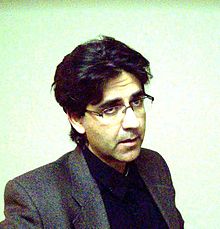Jorge Majfud | |
|---|---|
 Majfud at Jacksonville University in 2013 | |
| Born | September 10, 1969 Tacuarembo, Uruguay |
| Education | University of Georgia (MA, PhD) |
Jorge Antonio Majfud Albernaz (born September 10, 1969) is a Uruguayan American professor and writer.
Jorge Majfud | |
|---|---|
 Majfud at Jacksonville University in 2013 | |
| Born | September 10, 1969 Tacuarembo, Uruguay |
| Education | University of Georgia (MA, PhD) |
Jorge Antonio Majfud Albernaz (born September 10, 1969) is a Uruguayan American professor and writer.
Majfud was born on September 10, 1969, in Tacuarembó, Uruguay. He is of paternal Christian Lebanese descent, as his grandparents immigrated from Lebanon to Uruguay. His father, born to an impoverished family of 12 children, was a carpenter by trade and his mother, Marlene (née Albernaz; 1940-1984), was a sculptor. His father moved to Montevideo during the 1950s to study carpentry and radiotelephony, ultimately becoming a successful businessman in different sectors, including in agriculture, banking, and pharmaceutical. [1]
In 1996, Majfud received a bachelor of architecture from the University of the Republic. during which he traveled extensively to gather material that would later become part of his novels and essays. After his undergraduate studies, he became a professor at the University of Costa Rica and at Escuela Técnica del Uruguay, where he taught art and mathematics. In 2003, Majfud enrolled in the University of Georgia, where he obtained a masters and Ph.D. in the Department of Romance Languages.
Majfud is a member of the scientific committee of the Araucaria review in Spain, Phi Kappa Phi, and a Professional Member of PEN American Center. [2] He has taught at the University of Georgia and was a professor at Lincoln University. Currently, he is a professor at Jacksonville University.
Majfud has won many awards, including the Excellence in Research Award in Humanities and Letters in 2006, Casa de las Américas prize in 2001, a Juan Rulfo Award finalist in 2011, Faculty Award for Excellence in Scholarship and Professional Activities at Jacksonville University in 2013, and the Premio Letterario Internazionale Indipendente Settima (The Independent International Literary Award) in 2019. [3] His novels and essays are under study in different universities in Europe, [4] the U.S., [5] and Latin America, [6] [7] and is one of the most important writers of a new generation of Uruguayan intellectuals. [8] In 2012, readers of the American magazine Foreign Policy (now EsGlobal in Spanish) recognized him as "The Most Influential Latin American Intellectual". [9] He delivered public lectures at many universities and events around the world. [10] [11]
In 2024, Caras & Caretas magazine published that, according to artificial intelligence, Jorge Majfud was among the ten most recognized Uruguayans in the world. [12]
He has distinguished himself in different international contests, for example:
His publications include:
As contributor or editor
His stories and articles have been published in daily newspapers, magazines, and readers, such as El País of Madrid, [32] El País and La República of Montevideo, Courrier International of Paris , Rebellion, Hispanic Culture Review of George Mason University, Revista de Crítica Literaria Latinoamericana of Dartmouth College, Pegaso of the University of Oklahoma, Texas State University, Washington University Political Review, Chasqui of Arizona State University, Hispamerica of University of Maryland, United Nations Chronicle, [33] UNICEF, Araucaria of Spain, etc. He has been the founder and editor of the magazine SigloXXI – reflexiones sobre nuestro tiempo. He is a contributor to El Pais, La República of Montevideo, La Vanguardia of Barcelona, Tiempos del Mundo of Washington, Monthly Review of New York, The Huffington Post , Milenio of Mexico, Jornada of La Paz, Panama America, El Nuevo Herald of Miami, Página/12 of Buenos Aires, Cambio16 of Spain, Centro Cervantes of Madrid, The Humanist of the American Humanist Association, Radio Uruguay, Radio Nacional de Argentina , Radio Exterior de España], Radio Popolare Roma, NTN 24 TV , Russia TV (RT), and many other daily and weekly newspapers. He is a member of the International Scientific Committee of the magazine Araucaria in Spain.
His essays and articles have been translated into Portuguese, French, English, German, Italian, Basque, Greek, and many others. He is also the editor and translator of Ilusionistas, the latest book of Noam Chomsky in Spanish (Madrid, 2012). [34] [35] [36]
He has published many books with authors like Slavoj Zizek, [37] Eduardo Galeano, [38] [39] Ray Bradbury, [40] José Saramago, Mario Vargas Llosa, Carlos Fuentes, and Ernesto Sábato. [41]
In November 2019, after the coup d'état in Bolivia, Jorge Majfud called on OAS Secretary General Luis Almagro to resign from his post. The letter went viral and was supported by millions of Latin Americans. [42] [43] [44]